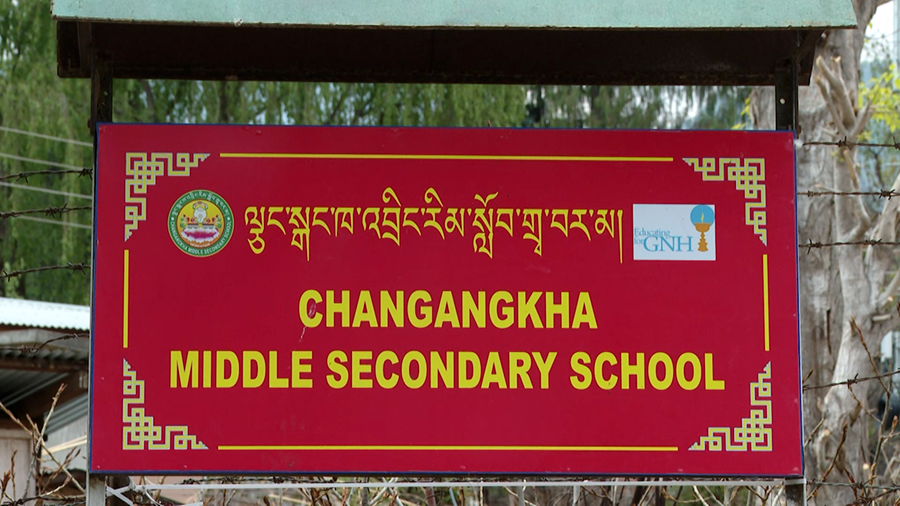
The country has come a long way in achieving inclusivity for persons with disability in schools and society. But there is still room for improvement. According to some parents of children with disabilities, despite the progress, challenges remain largely due to insufficient trained professionals to cater to children with disabilities in schools and institutions. Our reporter Sonam Yuden’s report sheds light on both the progress made and the work still needed to achieve full inclusivity for individuals with disabilities in Bhutan.
In the bustling hub of the capital city, concealed behind the gates of the Changangkha Middle Secondary School, thrives a dynamic atmosphere where students and children with disabilities engage in their studies and skills development.

“Changangkha School started as an inclusive school back in 2003. It started to cater to the needs of persons with disability. It has been nearly 21 years since its establishment and many students have studied and graduated from here. Moreover, last year, we started the inclusive ECCD because we saw many children from 3 to 5 years old have disabilities. Hence, to cater to them we started inclusive ECCD too,” said Nyendho principal of Changangkha Middle Secondary School.
The inclusive school at Changangkha Middle Secondary School not only benefitted children with disabilities but also their parents equally.
“I kept my child in the normal school before. There were advantages of keeping my child in the school, however, due to the lack of well-trained teachers and facilities, my child would always deny going to school. After enrolling in the inclusive school here, my child agreed to go to school because of the comfortable facilities and well-trained teachers because the teachers cater to the needs of the children and it benefits all of us. Moreover, the children are taught to interact with friends, and enough facilities are provided,” said Kuenzang Lhaden, a parent.
Moreover, children with disabilities are engaged in various courses such as skills development to help them become self-sustaining individuals later in life and are taught activities depending on their needs.
“If we look at the children this year, there are at least 10 different disabilities. When students have different disabilities and ailments, we need to give them various programs. Firstly, we cater to students with mild disability who are placed in the general class with the students for accommodation and adaptation. Then is the moderate disability, who are cognitively weak. Around 44 students are taking skill development programs such as tailoring, cooking, laundry, and arts and crafts. Importantly, 42 students with severe disability are given life skill education, which is also known as the activities of daily living skills. They are taught how to go to the toilet, to eat food, and to take care of themselves,” added the principal.
In addition, according to the principal, the inclusive Early Childhood Care and Development within the school premises ensures that children aged three to five years with mild and moderate disabilities are assessed properly and engaged in the required programmes.
Does this progressive narrative mean we have achieved the ultimate goal over the past 20 years? Numbers suggest so. Today. there are around 45 inclusive schools and 3 inclusive ECCD centres across the country. But how many parents and caregivers are aware of these numbers?
Moreover, parents BBS talked to said there are still challenges when it comes to having adequate well-trained teachers to cater to children with disabilities.
Also, this story reflects the lives of children with disabilities enrolled at the Changangkha Middle Secondary School in Thimphu only.
“Be it in ECCD or the schools, we do not have enough trained teachers. In school too, if we keep our children in the general class, the class already has 20 students and each class probably has a forum for five children with disabilities. There is only one teacher and when the teacher teaches all the students in general, it is difficult for the children to comprehend. Other students can grasp it but children with disability have a hard time understanding unless they are allocated time and space separately,” said Lhakpa Dema, a parent.
Similarly, Ability Bhutan Society, a civil society organization which provides early intervention to children with disabilities said that the country can do better to enhance inclusivity.
“Some schools do not call our children even after a month of school reopening. When the parents ask why their children are not being called, the schools say that they are not ready yet and some say that the teachers are not there. Just recently, a parent came to us from Lhuntse to enrol the child with us. They didn’t even know that Lhuentse had a school with SEN programs. Hence I feel we need to create more awareness. Moreover, the ministry is now providing diploma courses to teachers in the Paro College of Education and Samtse College of Education which is a good thing and I think the teachers should at least be well equipped with it,” said Pema Yuden, a social worker at the Ability Bhutan Society.
According to the ECCD and SEN division of the education and skills development ministry, compared to previous years, the situation has improved greatly and said that they are working towards capacity building to enhance inclusive schools.
Sonam Yuden
Edited by Phub Gyem










